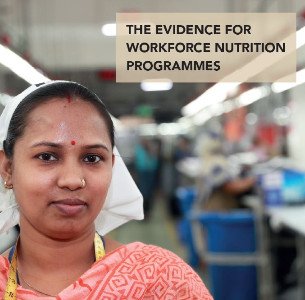The World Health Organization (WHO) have released a new guideline, “Policies to protect children from the harmful impact of food marketing”
Other content with the tag "NCDs - non communicable diseases".

Over the past few decades, tobacco and alcohol taxes have gained widespread recognition as an effective public health tool to reduce the consumptio

Unhealthy food environments drive the increase of diet-related non-communicable diseases (NCDs). Using the Healthy Food Environment Policy Index

High intake of free sugars has been linked to overweight and obesity, which affects nearly 40% of the global adult population and millions of child

Unhealthy diets are a leading risk factor for non-communicable diseases and negatively impact environmental sustainability.

India is facing a rapidly escalating public health crisis of non-communicable diseases (NCDs) with millions suffering from diabetes, cancer, and ca

PAHAL (Partnerships for Affordable Healthcare Access and Longevity) is USAID and IPE’s flagship innovative financing platform to promote health fin

Though this paper has restricted access, it offers an innovative and effective methodology to improve the level

In this short yet compelling video, we see traditional markets through the eyes of both a consumer (Felicia) an

This book from the World Bank presents the landscape of food safety, particularly in low and middle incom

This peer-review article in BMJ Nutrition Prevent & Health highlights an important area where public and private sectors need to align: brand a

In this video, a single mother living in South London tells us about her struggles to find fresh, affordable and healthy food.

The SUN Business Network (SBN)/Global Alliance for Improved Nutrition (GAIN), with the support of Resolve to Save Lives, an initiative of Vital Str

When asked in a poll, more Americans said that figuring out what to eat was harder than doing their own taxes.

This article in Gulf Business sets out how health legislation can affect employee nutrition and health in the Middle East.

This short flyer from the Government of Australia's Prevention Partnership Centre provides lessons learned from a programme aimed at engaging small

This modelling study published in the BMJ finds that a 20% price increase in high sugar snacks has the potential to reduce overall energy purchased

New study on nudges for shaping consumer behaviour towards healthier food choices looks at 299 results from 96 field experiments.

This paper looks at the impact of supermarkets and hypermarkets on diets in urban areas of Zambia, taking income and other socioeconomic factors in

This podcast explores US agricultural policy through a Cold War lens, discussing the ‘Farms Race’ between the US and the Soviet Union.

New study from researchers at IFPRI looks at the relative caloric prices (RCPs) for different food categories across 176 countries and how they rel

New study in the Lancet calculates historical and future availability of fruit and vegetables compared to the amount recommended by the World Healt

The 44th edition of the UNSCN Nutrition - Food environments: Where people meet the food system - looks at how food environments influence

Priobiotics have become one of the most popular nutritional supplements in recent years. This mini review paper shows that this is in part caused b
This paper assesses how employee nutrition impacts on productivity, absenteeism, and healthcare costs.

This set of briefs from GAIN provides evidence to support the effectiveness of workforce nutrition programmes.

In 2018, FReSH hosted Science to Solutions Dialogues (SSD) between
In this supplement issue of Maternal & Child Nutrition, Helen Keller International (HKI) authors have writte

"Culture overwhelms some of our best programmatic work in nutrition and health, and we fail to appreciate the power of business an

IGD and FIA conducted this study to explore the consumer attitudes towards healthier product reformulation, the progress within the industry and th
Results of a day-long meeting between food industry scientists, food, nutrition, and health related scientific societies and various U.S.

This review gives an overview of food-based dietary guidelines by region and date, alongside looking at key messages about certain produce.
One-page correspondence in the Lancet looking at the benefit of investing in workplace wellness programmes in India.
Impact of increasing the proportion of healthier foods available on energy purchased in worksite cafeterias: A stepped wedge randomized

This report produced by the UK Health Forum provides case studies from around the world to help provide a framework for governing public private in
Realising the potential of workplaces to prevent and control NCDs: How public policy can encourage businesses and governments to work toget
A worksite intervention in South Africa demonstrates the importance of identifying employees with increased risk of cardiovascular disease.
China has undergone rapid change in recent years which has impacted on the health of its workforce.
Two-page briefing on a research study by the United Nations International Labour Organisation assessing Chile’s national workforce nutrition progra

Chapter four of the Global Nutrition Report looks at diets as both a cause and a solution to malnutrition.

This is a report from a workshop on communication and collaboration on public health and nutrition between the private sector, academia, government

This is a great podcast from The Doctor's Farmacy that touches on a lot of important aspects of public private engagement for nutrition. Host Dr.
Academic article from 2014 looking at effective workforce health promotion strategies.

This landmark paper does not only make recommendations, it shows what can be done with the global resources we have and are likely to have in the f

This book by the International Labour Organisation asks important questions about food at work, including: employment conditions, wages
The Micronutrient Forum is a convener of academics, policy makers, and program implementers.
The database includes 40 indicators of the status of 17 micronutrients or micronutrient-related conditions, covering both deficiency and excess.
The Strengthening African Processors of Fortified Food Initiative is forging new partnerships between business and government.

Being able to track and measure the impact of business on food and diets is key to ensuring that businesses make positive contributions




